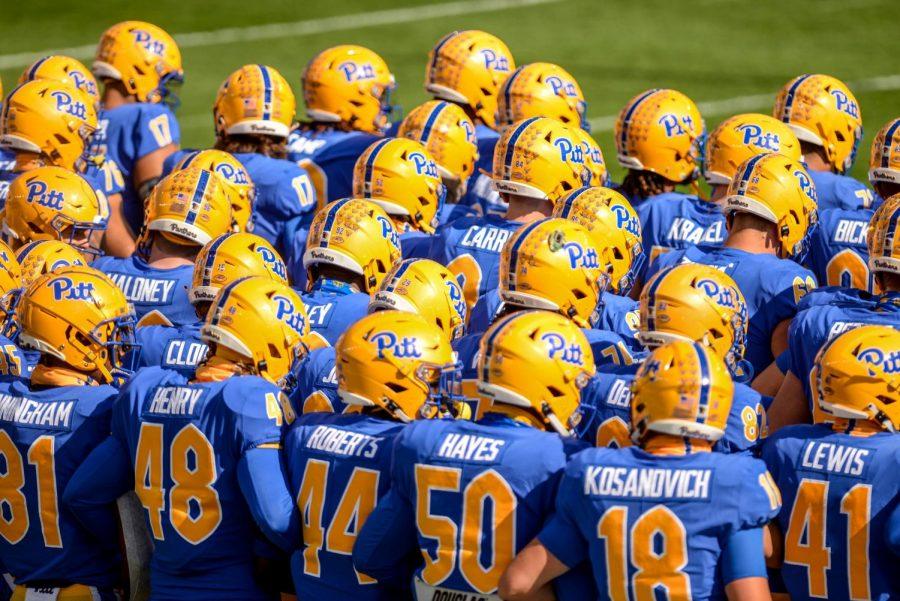Opinion | There is an ‘I’ in team
The Pitt football team.
January 20, 2023
Anyone who has played a sport or has watched Friday Night Lights has heard the speech about leaving your baggage at the door before getting on the field. It is a common sentiment that when athletes play a sport, they put aside their differences and join a common fight. That is what makes them a team and helps them win.
This idea is constantly repeated by coaches, players and commentators with the intention of drawing emotion. It is said as a comforting and heartwarming message, but there is a backward logic of this attempt at unity.
Those who derive comfort from it are likely the ones who are not expected to give up any part of themselves. The reality is that not everyone is forced to put aside their identities. That is only required for those who are not straight, white Christians.
The Muscular Christian movement began in the 1800s and believed in building virtue through sports. They thought men were becoming weak and needed to be strengthened by sports, particularly the more violent ones. This kind of suffering would make these men build character and better fit to serve God, they thought.
President Theodore Roosevelt combined this ideology with American sports culture. In 1893, he wrote about how sports are centered on risk and danger. This was before standard safety precautions, and games would end with injured bodies lying on the field. While some were concerned by the violence, the Muscular Christians and Roosevelt used it to fuel their faith in both the strength of America and God’s word.
This may seem like distant history, but Christian undertones still exist in professional sports and are accepted as a part of the culture. When achieving some of the highest athletic honors after years of hard work, it is normal for athletes to give all of the credit to God in their postgame interviews. It is a good thing that they can practice their Christianity without criticism. But this fair treatment and respect isn’t given to everyone.
The conversation surrounding the aggressive Christian messaging in sports has come up time and time again and doesn’t always affect professionals.
In 2022, the Supreme Court ruled in favor of a public high school football coach holding a group prayer on the field after games. The ACLU commented on how this defied the boundary between church and state while also compromising the religious liberties of students.
Christian athletes do deserve to practice their faith, and it is unreasonable to expect them to abandon that aspect of their identity completely. We have to allow the same respect to athletes who are not Christian, which is something largely overlooked in the sports world.
The reality is that it is impossible for players to leave crucial parts of themselves off the field. This is especially true regarding the abuse minority players receive from fans.
Nazem Kadri, a Muslim athlete in the NHL, played for the Colorado Avalanches from 2019 to 2022. In their 2022 game against the St. Louis Blues, Kadri was pushed into the Blues goalie, Jordan Binnington. As a result, Binnington suffered an injury that ended his postseason run. The officials did not see any misconduct on the part of Kadri, but that did not stop the online harassment. Kadri was flooded with messages of violent Islamophobia, with many people threatening death. The threats were so severe that the NHL asked local law enforcement to increase security so he could remain safe at the rink.
Regardless, Kadri won the Stanley Cup with the Colorado Avalanches that season, becoming the first Muslim player to do so. Full of pride, Kadri brought the Stanley cup to his hometown’s mosque in London, Ontario, honoring his community. This moment was especially important as the town had experienced an Islamaphobic attack the year before, which led to the death of four of their community members.
Kadri shows the importance of individuality and faith. “It’s a part of my roots, it’s a part of who I am,” he said when talking about the celebration in his hometown.
Not all kids may see athletes as warriors for God, but they are still admired as heroes. Athletes make up some of the biggest celebrities in the world and have incredible reach. As a result, kids look up to them and are susceptible to their behaviors.
Kadri proved to young athletes that there is room for diversity, but they also saw how racist sports communities can be. When this discriminatory behavior is normalized among participants and spectators alike, kids will continue to understand that it naturally comes with athletics.
When learning the basics of teamwork, I’m sure we can all recall being told that “there is no I in team.” I think this phrase ignores what we should value when it comes to teamwork. Embracing individuality doesn’t mean that it is impossible to come together on the field. Sports should be a place where players can acknowledge their religion, whether they practice Christianity or not.
How can we make youth sports a welcoming environment? We can abandon outdated messaging favoring Christianity in public schools and the national leagues. We can encourage individualism in kids while teaching teamwork. Ignoring differences to fake a sense of unity is not good enough.
Jameson Keebler writes primarily about pop culture and current events. Write to her at [email protected].









